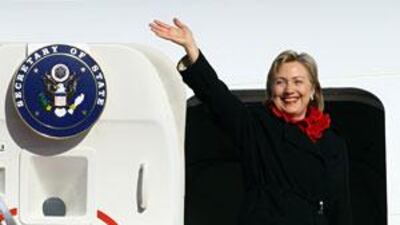North Korea will face UN sanctions if it goes ahead with a long-range missile test which would be seen as a threat to the region, South Korea's foreign minister said today. "Whether the North launches a missile or a satellite, it is still a violation of a UN Security Council resolution," the foreign minister Yu Myung-hwan told a group of diplomats and journalists. "It will inevitably be followed by sanctions." The US Secretary of State Hillary Clinton said in Tokyo yesterday that such a launch would be "very unhelpful" and Washington was watching the North's moves very closely. The North appears to be readying a launch of the Taepodong-2, its longest-range missile, which experts said is designed to strike US territory but has never flown successfully. The North contends the rockets are the key to its peaceful space programme and said this week it had the right to launch it. In addition, South Korea's Dong-a Ilbo newspaper, quoting a government source, on Wednesday said North Korea had been running a uranium enrichment plant near its main nuclear complex in Yongbyon, about 100km (60 miles) north of the capital, Pyongyang, albeit on a small scale. South Korean officials declined to comment on the report. The possible existence of an uranium enrichment programme, which could offer an effective way of developing nuclear arms, has been a persistent sticking point in diplomacy. A US accusation that Pyongyang was clandestinely operating such a plan led to the breakdown of a 1994 disarmament deal and the start of new, six-way nuclear talks in 2003.
Mrs Clinton is hoping to rehabilitate America's image abroad, especially with Muslims, during a visit to Indonesia and to strengthen economic and development ties with South East Asia. She arrived today, her second stop in an inaugural overseas trip as the top US diplomat. While in Jakarta, Mrs Clinton intends to announce plans to step up US engagement with South East Asia, stressing the growing importance of a region that often felt slighted by the Bush administration. Her two-day schedule in Indonesia includes a visit to the South-east Asian Nations (ASEAN) secretariat and she is likely to signal America's intent to sign the regional bloc's Treaty of Amity and Co-operation. Mrs Clinton will also pledge to attend the group's annual foreign ministers meeting in Thailand this year, US officials said. Development and climate change also will top the agenda during her meetings with Indonesian leaders, along with the Iranian nuclear dispute and the war in Afghanistan. Indonesia is the world's most populous Islamic nation, and it has personal ties for President Barack Obama, who spent four years of his childhood here.
Meanwhile Kim Jong Il is making promises and urging citizens to vote ahead of an election that was delayed amid his reputed health problems. The reclusive leader, who rules his impoverished yet nuclear-armed country with an iron fist, has appealed to citizens ahead of balloting next month for the Supreme People's Assembly - North Korea's rubber-stamp parliament. "I will live up to the expectations of the entire electorate by devoting my all to the prosperity of the country and happiness of the people," Mr Jong Il said in an "open letter" to voters carried today by North Korea's state news agency. Mr Jong Il was out of sight for months last year after reportedly suffering a stroke, presenting the possibility of a power vacuum in the enigmatic nation he has ruled since the 1994 death of his father, the North Korean founder Kim Il Sung. Last month, though, Mr Jong Il emerged to meet a visiting Chinese communist party official. Though looking somewhat thinner, his appearance at the meeting signalled he remains in charge. "Now that he's recovered his health, he may be trying to rally the public around him," Korean affairs expert Peter Beck, who teaches at American University in Washington, said of Mr Jong Il's appeal to voters. Mr Jong Il rules North Korea through his positions as supreme commander of the Korean People's Army, general secretary of the Workers' Party of Korea and chairman of the country's National Defence Commission. Paik Hak-soon, an expert on North Korea at the Sejong Institute, a policy think tank near Seoul, said Mr Jong Il does not need a legislative seat to hold those positions. "It's a political rationalisation on the part of the North Korean leadership that he represents the government as well and, more important, the people," Mr Hak-soon said. * AP and Reuters

